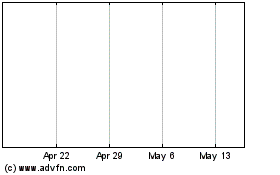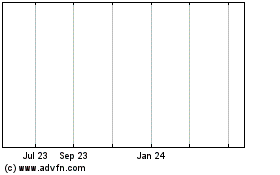Royal Dutch Shell Sets First Short-Term CO2 Target
March 14 2019 - 1:12PM
Dow Jones News
By Dieter Holger
Royal Dutch Shell PLC (RDSA.LN) has set a short-term
cardon-dioxide emissions target for the first time, the company
said Thursday.
The oil giant said it aims to cut its net carbon footprint by up
to 3% by 2021, compared with 2016, as it works toward meeting its
goal of halving its greenhouse gas emissions by 2050.
"We are seeking cost-effective ways to manage GHG emissions and
see potential business opportunities in developing such solutions,"
Shell said.
Shell's total GHG emissions fell in 2018 by 3.5% to 82.24
million metric tons of CO2 equivalent from 85.25 million in 2017,
according to the company's annual report. Shell made emissions and
other environmental metrics available for the last two years in the
report.
The company's GHG intensity--a measure of emissions when
compared to production--from refining and hydrocarbons fell by 7.9%
and 4.8%, respectively, Shell said. However, GHG intensity for
petrochemical production rose 1%.
In December 2018, Shell agreed to set short-term CO2 targets as
part of its long-term carbon reduction ambitions, following
pressure from Climate Action 100+, a group of environmentally
conscious investors representing more than $32 trillion in assets
under management. At the same time, Shell also said 10% of
executives' remuneration would be linked to carbon reduction
targets.
The company said in 2017 that it would start spending $2 billion
a year to fight climate change and to achieve the goals of the
Paris Climate Agreement of keeping global warming well below 2
degrees Celsius.
But Follow This, a group of more than 4,600 shareholders in oil
companies including Shell, said the oil company's short-term
targets and actions don't go far enough.
"Shell takes another step towards Paris, however, this will not
get us to Paris," said Mark van Baal, founder of Follow This.
The International Panel on Climate Change has said there needs
to be a 70% to 100% reduction in energy emissions by 2050 to meet
the goals of the Paris agreement, but Shell is only achieving an
absolute reduction in emissions of 30% by 2050 when factoring in
the growing energy demand it anticipates in the coming years, Mr.
van Baal said.
"While we are committed to reducing our GHG intensity, as energy
demand increases and easily accessible oil and gas resources
decline, we may develop resources that require more energy and
advanced technologies to produce," Shell said. This could result in
an increase in direct GHG emissions, it added.
"The oil and gas industry can make or break the Paris Climate
Agreement," Mr. van Baal said.
Write to Dieter Holger at dieter.holger@dowjones.com;
@dieterholger
(END) Dow Jones Newswires
March 14, 2019 12:57 ET (16:57 GMT)
Copyright (c) 2019 Dow Jones & Company, Inc.
Shell (NYSE:RDSB)
Historical Stock Chart
From Jun 2024 to Jul 2024

Shell (NYSE:RDSB)
Historical Stock Chart
From Jul 2023 to Jul 2024
